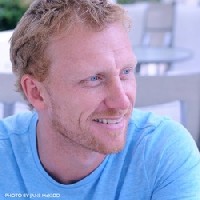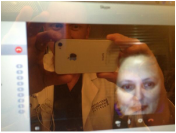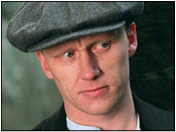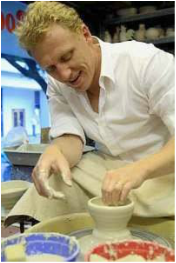Kevin McKidd steps behind the camera to direct his hit show.
“Grey’s Anatomy” doctor Kevin McKidd has one special thing in common with Jensen Ackles (“Supernatural”), Jon Cryer (“Two and a Half Men”), David Boreanaz (“Angel,” “Bones”) and Zachary Levi (“Chuck”): All five actors have directed episodes—in some cases several—of the shows on which they star. For McKidd, the experience was something he had wanted to do for a long time. Taking advantage of “Grey’s” ensemble cast, the veteran actor started shadowing directors on the set before being handed the reins to helm webisodes of the hit ABC medical drama, a gig he highly recommends to his fellow thespians looking to make the switch to behind the lens.
Back Stage caught up with McKidd to discuss his experience at the helm of the Feb. 3 episode of “Grey’s Anatomy”—titled “Don’t Deceive Me (Please Don’t Go)”—and how being an overthinking actor helped him.
Back Stage: When did you first get the bug to direct?
Kevin McKidd: I’ve wanted to direct for a long time. I’ve always been too busy as an actor, but on this show, because it’s such a large ensemble, you can have episodes where it’s pretty light for you. It seemed like the perfect fit to kind of go, “Okay, this might be the area that I can start to maybe shadow and learn and observe.” I went and approached ["Grey's Anatomy" creator] Shonda [Rhimes] and [executive producer] Rob Corn last year and said I’d like to start shadowing this year. They were really both excited. Then, from that, directing the webisodes came about, which went really well. I was amazed that they offered me a full show. It’s not small potatoes, you know? I took the full weight of it upon myself and stressed out and lost a lot of sleep over it.
Back Stage: How did directing the webisodes prepare you to direct a full episode?
McKidd: Well, the biggest thing psychologically was the fact that there wasn’t any other person on that set saying the words “action” and “cut.” It was less pressure of a situation. I got the chance to get my feet wet before the big show, which was ideal, really. Also, the webisodes, even though they’re smaller in scale, essentially are scenes of the show. The preparation and the process to produce them is exactly the same. We went through the same ins and preparation that we did on the show. It gave me a dry run and a prep. They were essential for me. I recommend anybody who’s interested in directing do the webisodes, because it gives you that confidence that you’ve done it once before; maybe not on such a big canvas, but it’s still the same process.
Back Stage: When you were in the director’s chair, did you have to turn off the acting side of you?
McKidd: I actually think it was my main strength, really. I think sometimes there can be a lot of communication issues between actors and directors on set, especially the pace that TV is set at. Good directors can get an actor to where they need them to be quickly in a shorthand of dialogue without the actor feeling like they’re being pushed or shoved or pulled to kind of be a chattering monkey. All the actors came up to me afterward and said they really felt listened to, but we didn’t waste any time. I cut to the chase a lot because I’m an actor. I know more instinctively what works for actors and what doesn’t. Some directors who have always just been behind the camera maybe haven’t acted or don’t know what that process is.
Back Stage: You’ve said in the past that you’re prone to overthinking scenes as an actor. Did you have that same experience as a director?
McKidd: Having done it now, I think it’s the director’s job to overthink the scenes. Of anybody on that set, it’s that person’s job to have lived with that script and have read it so many times and have it inside their bones. An actor should do that too, but I think an actor can just focus just on the lines, whereas the director has to think of every single detail. It played on my strength of overthinking and working and reworking and studying stuff. I spent every day for the week leading up to my show directing on the stage and on my own. What’s interesting as a director, if you plan it in that way, that you walk the scene ahead of time and come up with an idea of where you think the actors should be. Because I’m an actor, I acted out every scene and playing every role in the episode beforehand. Obviously, understanding that an actor will show up and maybe have a different instinct. You have to come as a director, especially on TV, with an idea that can then change. You can’t just show up and say, “What do you want to do?”
Back Stage: Did you have to direct yourself much? Is Owen in this episode a lot?
McKidd: I’m in one scene, which I directed. The scene that I was in, which is a very funny scene, I was nervous. It was on the second day and I was still nervous. As soon as I got a chance to disband from the camera and act again, suddenly everything came into place. I don’t think anybody expected that. Everybody thought it might be too much for my brain to handle. For some reason, being able to act a little bit was the scene that stabilized me, and I was fine from that point on.
Back Stage: Did you get any flak from [onscreen wife] Sandra Oh?
McKidd: The whole crew and cast were so supportive. They could have easily acted out. They all knew that it’s a big deal and it’s a lot of responsibility and I didn’t want to screw up. There was a point with Sandra where I was trying to nudge her into being slightly melodramatic in a certain moment. She was like, “Whoa, whoa, Kevin. No, no.” Because she knows that I wouldn’t have liked that direction if I was doing it. So, we had a joke about that.
Back Stage: Do you have any plans to direct future episodes?
McKidd: I’d like to. They really seemed happy with the end product, which is the important thing. I’m open to doing it again. But I certainly don’t want to become a director. I’ve realized that. My first love really is acting. But it feels like it’s a natural progression for me as I go forward and start using that experience to build to my own independent project—probably more European-based independent films in the future that I might act and direct. But it’s opened up a whole new world for me.
source







